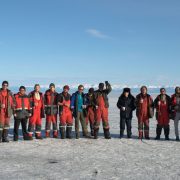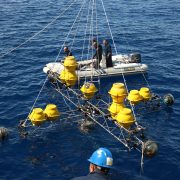In April 2017, the global neutrino telescope community realising telescopes across the globe, made important progress at two locations very distant from each other.
 On April 9th, after an intensive deployment campaign, the Baikal GVD neutrino telescope in Lake Baikal, Russia has been successfully extended with a second cluster of detection units. The telescope is now taking data with a total of 576 optical modules. The KM3NeT Collaboration congratulates its Russian colleagues for this important achievement.
On April 9th, after an intensive deployment campaign, the Baikal GVD neutrino telescope in Lake Baikal, Russia has been successfully extended with a second cluster of detection units. The telescope is now taking data with a total of 576 optical modules. The KM3NeT Collaboration congratulates its Russian colleagues for this important achievement.
Two days later, on  April 11, in the Mediterranean Sea, a team of Greek KM3NeT physicists successfully recovered a prototype detector from a depth of 3000 m, 16 miles west of Pylos, Greece. The detector with 8 optical modules operated autonomously on batteries during four months. The collected data are currently being analysed. The KM3NeT Collaboration congratulates its Greek partners for this important step toward realisation of the future KM3NeT-Gr site.
April 11, in the Mediterranean Sea, a team of Greek KM3NeT physicists successfully recovered a prototype detector from a depth of 3000 m, 16 miles west of Pylos, Greece. The detector with 8 optical modules operated autonomously on batteries during four months. The collected data are currently being analysed. The KM3NeT Collaboration congratulates its Greek partners for this important step toward realisation of the future KM3NeT-Gr site.

